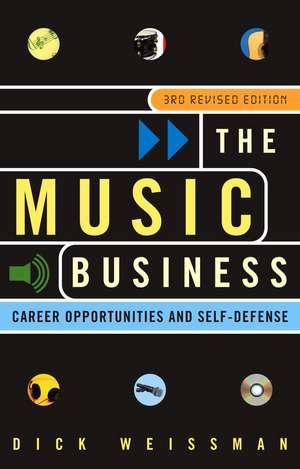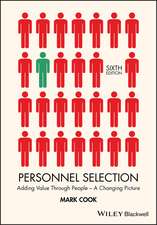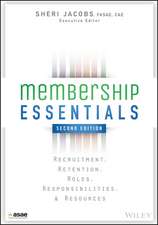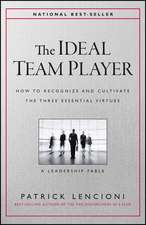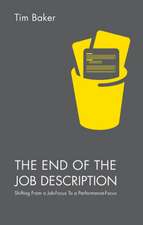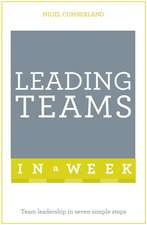The Music Business: Career Opportunities and Self-Defense
Autor DICK WEISSMANen Limba Engleză Paperback – 30 apr 2003
into the Music Business
Completely revised and updated for the twenty-first century, The Music Business provides essential career advice and information on how to get started and advance in all areas of the music industry—from an author who’s had careers in music as an artist and professor for more than two decades. This comprehensive volume gives you guidance and information on:
• Starting your music career
• The ins and outs of recording contracts
• Record producing and music engineering
• The distribution and sale of records
• The Internet and MP3s, and their effects on the music industry
• The latest computer programs
• Copyright law
• Composing music and songwriting
• Music education
• The international music industry
• And much more . . .
The Music Business is an indispensable reference for anyone who wants to begin a career in any of the industry’s facets, as well as an invaluable aid to professional and would-be professional musicians alike.
Preț: 145.36 lei
Nou
Puncte Express: 218
Preț estimativ în valută:
27.82€ • 29.11$ • 23.15£
27.82€ • 29.11$ • 23.15£
Carte disponibilă
Livrare economică 10-24 martie
Preluare comenzi: 021 569.72.76
Specificații
ISBN-13: 9780609810132
ISBN-10: 0609810138
Pagini: 416
Dimensiuni: 131 x 205 x 24 mm
Greutate: 0.3 kg
Ediția:Rev
Editura: Three Rivers Press (CA)
ISBN-10: 0609810138
Pagini: 416
Dimensiuni: 131 x 205 x 24 mm
Greutate: 0.3 kg
Ediția:Rev
Editura: Three Rivers Press (CA)
Notă biografică
DICK WEISSMAN is a professional musician, recording artist, composer, and record producer. He currently teaches short classes and seminars, and he consults for the University of Denver, Scott-Anderson Associates in Kingston, Jamaica, the Liverpool Institute of Performing Arts, and various other organizations. He is also the author of Songwriting: The Words, the Music, and the Money and Making a Living in Your Local Music Market. He lives in Astoria, Oregon.
Extras
1
Getting Started
BEFORE I discuss the structure of the music industry, I'd like to take you through the complete process that a beginner or a near-beginner in the industry might need to experience in his efforts to start a music business career. This is only a single example of someone getting started, and the situation may not apply to you or your own problems in starting a career. This is intended as a road map, not as a complete guide to the territory.
I am basing this part of the book on questions that people have asked me or that I have heard them ask others in the last few years. Denver, the metropolitan area where I have been living for most of the last twenty-two years, is a fairly typical American city in the sense that there are some reasonably good recording studios, a few very small record companies, a number of clubs to perform in, and a reasonably good symphony orchestra. Denver is not a center for national recording, so some of the frustrations or career roadblocks felt by the person in this example may not hold true if you live in Nashville, New York, Los Angeles, or Toronto. On the other hand, living in a major music town doesn't necessarily provide you with access to what Joni Mitchell so aptly calls the "starmaker machinery."
Let's say that you are a singer-songwriter. You live in a medium-sized town, say Dubuque, Iowa. You have had a little bit of performing experience, but nothing of an extended nature. In other words, you haven't been on the road or played outside the immediate area in which you live, but you do have twenty or twenty-five songs that you have written, and you're really not sure what to do with them. Let's further assume that you have not copyrighted the songs, you don't have an agent or a manager, don't really know anyone making a living in the music business, and are not a member of the union. I am assuming that you have made a commitment in your own mind to try to pursue a successful career in music.
The first thing that you need to do is to get as much performing experience as possible, on whatever level it is available. Offer your services, probably without charge at this point, to hospitals, homes for the elderly, schools for the retarded, public and private schools, parties, or to any other group that might enjoy watching a musical performance. As you begin to get more comfortable with performing, try to notice what is working well in your performances and what doesn't work at all. Try a few of your own songs in your shows, but don't restrict yourself to your own material. What songs do people like? Solicit comments on what you are doing, and listen to unsolicited comments. Have your friends attend some of these performances and ask them to listen to what people are saying about you. Think of this period in your career as a growth or experimental period, during which you are putting together a show that will hopefully make you some money in the future. Experiment with your material and your musical arrangements. Make some songs longer than you originally wrote them, take some instrumental solos if you can, use different tempos and try different keys, do some sections of a song louder or softer than others, and so on. If possible, tape some of your performances and some of your rehearsals, and try to be objective about the results. Tape a song before and after you have changed the arrangement and compare the results. Some things will work, other things may not.
After this period of trial and error you should have put together some kind of a coherent show, including some of your own songs. Do guest sets in clubs and begin to start asking for money for your performances. Find some other musicians to jam with through music stores, music school bulletin boards, friends, and so forth. At this point you may want to decide whether you want to play in a band or pursue a solo career. What kind of music are you playing? If you play hard rock, you will need to have a band to get the effect you want. Do you have enough original songs of your own? Are you a great harmony singer who doesn't have a wonderful solo voice? Do you have some friends who have good sound equipment who are looking for an additional performer who plays rhythm guitar, or piano, or whatever you play?
With or without a band, you will need to make a demo tape for the club owner or school staff person who wants to hear a sample of your work. It doesn't have to be a professional tape recorded in an expensive studio. It should represent what you do well enough to give an accurate impression of your sound. Take some time in doing the tape to achieve that result. Sometimes people working in high-fidelity stores or at college radio stations have reasonably good sound equipment and enjoy recording tapes of this kind. See if you can find someone like that to do your tape. Often they will be happy to do your tape for the cost of the tape itself, or for a very small fee. A 16- or 24-track studio will cost you between $25 and $200 an hour, plus tape costs, ranging from about $45 to $450 or so, depending upon whether you use the digital or analog format. Don't go into the studio thinking you will make a cheap tape.
You should limit the number of tunes on your tape to three or four. In the early stages of your career it is unlikely that anyone will listen closely to much more than that. Don't put very long or esoteric songs on a tape for a club owner. Rather, show the range of what you can do, including perhaps a ballad, an up-tempo song, and a unique arrangement or song of your own. It is always possible to do a live audition and sing other tunes for a club owner who expresses real interest in what you are doing. You will also need some photos of yourself--you might again try your friends or someone studying photography at an art school. This will minimize your costs.
Let's say that you are now beginning to get work in some local clubs, as a solo act or as a member of a group. Should you copyright your songs? The copyright fee for each song is now $30, so that for twenty songs you are looking at $600. It is possible to copyright a group of song under one name, such as the Jane Smith Songbook. This will cost you $30 and will protect your songs. As each song gets recorded or published in the future you will have to copyright it separately, but this will save you some money for now. To copyright a song you must include a lead sheet with the melody line, lyrics, and chords of your song (see the Appendix of this book for a lead sheet [p. 325] and the address of the Copyright Office [p. 392]). In my opinion, at this stage no one is apt to steal your songs. It is possible, but unlikely, that someone will run off with your song and copyright it himself. If someone else has to write your lead sheet for you because you don't read or write music, that person will probably charge you from $10 to $35, depending on his experience. Music school students are a good source for relatively cheap lead sheets. With your demo tape you should include photocopies of any favorable reviews that you have received in local newspapers or magazines. The copyright office prefers that you put no more than ten songs on a tape. To use this method, ask for form SR. If you are doing lead sheets, use form PA.
Home Studios
The last five years have seen a vast improvement in home semiprofessional studio equipment, with such formats as 4-track cassettes and 8-track A-DAT, or Alesis digital audiotape, and hard disk formats, and recorders available at reasonable prices. With an investment of a few thousand dollars you can now put yourself in a position to make quality demo tapes at reasonable prices. Working with this equipment will also pay off in terms of enabling you to develop studio experience, which will save you time once you get into a larger studio.
Videos
It is now possible to make a video demo at a local college or cable TV channel. Most local cable facilities offer some sort of community access programs.
If you can make a reasonable video demo, it will enhance your ability to get work in clubs and to get a recording contract. The difficulty lies in whether you will get a reasonable amount of editing time in a facility that has quality editing equipment. A poor video demo is probably a worse selling tool than having none at all.
About a dozen locals of the American Federation of Musicians (AFM, the musicians' union) provide free video services for their members. Once again, the value of such demos is going to depend on the quality or availability of good editing equipment.
You can now take your audio or video demo to various club owners or managers together with your photos and any good reviews of your work. Offer to do a live audition. As you start to get local club jobs and build a reputation, you will probably be approached by local booking agents, who will flatter you and make promises of work if you sign an exclusive agreement with them. Avoid signing any exclusive or long-term contracts at this time, if you possibly can. If you are headed for New York or Los Angeles, why tie yourself up with an agent in Dubuque who will continue to collect commissions on your jobs in New York, but who doesn't have the contacts to get you work outside the immediate area? Don't sign with a personal manager in a small town unless you are convinced that she is as ambitious as you or more so. Will she go anywhere it is necessary to promote your long-range career? Do take local jobs from booking agents, and pay them the required commissions on the work they get for you. If necessary, sign a relatively short-term contract, say for six months or a year, to book you exclusively. Don't do this until you have some definite offers of work. The offers should be for reasonable amounts of money in clubs that you are familiar with and should specify the number of shows, wages, and so forth. Take the advice of your booking agent about the union--you may have to join the AFM local in your city as you start to work in better clubs or in concerts. Before you join the union go down and talk to the officials about the dues, the initiation fee, any possible work dues, and what will be required of you as a union member.
Strategies for Leaving Town
Let's say that you are now ready to leave Iowa and try for the big time in a major recording and talent center. Before you go you may want to take a few precautions. First of all, save up a certain amount of money--enough to sustain you for at least three or four months as you attempt to become established in your new city. You can't reasonably expect to start working right away, and you will need a cushion to sustain you while you get to know the new city, make contacts, and so on. Upgrade your sound equipment. In a larger city you can't get away with inadequate equipment--the competition is too tough. Plan on getting new instruments or amplifiers if you need them--maybe even a whole new sound system. Make another demo tape. This time pay more attention to the sound quality and be sure to include some original songs. The purpose of this demo will be to interest a major agent or manager in a big city. Have some new photos taken, put together your best reviews, and possibly buy some new stage clothes. Where will you live in the big city? Do you have any contacts in the business there? Perhaps a local agent in your hometown knows an agent, a manager, promoter, or record company employee who can put you in touch with business in your new town. Do you have any other marketable skills? In other words, do you have another way to support yourself while you are knocking on music business doors? Have you ever been a waitress, waiter, temporary office worker, or taxi driver? It may take you some time before you become self-supporting with your music in a new environment.
You have now arrived in the big city. Look for clubs that have open stage nights, songwriters' showcases, etc. Some of these clubs may be famous places, like the Roxy in Los Angeles, and some may be small unknown bars. Try to meet other composers and musicians through music stores, music schools, clubs, and ads in papers like the Village Voice in New York. As a member of the Iowa union you will be allowed to accept one-night jobs in union clubs in New York or Los Angeles, but you will be prohibited from accepting steady work unless you transfer your card (which usually takes six months) or unless you get a card in your new local. The larger locals of the musicians' union generally charge higher initiation fees and dues than the unions in smaller towns. There is also usually a residency requirement of some minimum amount of time. Sometimes the union will waive this residency requirement, formally or informally, if you can pay the full initiation fee or if another member of the local vouches that their group must include you in order to continue working. If you have not joined the union before, you almost certainly will need to do so now.
As you start to get jobs in clubs you will meet agents again. Most of them will dress better (or flashier), talk faster, and be harder to figure out than the agents in your hometown. Beware of signing long-term agreements based on verbal promises without actual contracts that offer specific jobs. Find out what acts the agent is currently booking, and if possible talk to the acts about the agent. If possible go through a trial period until you are convinced of what the agent can do for you. It is also a good idea at this point to make sure that the agent has a union franchise. If you are in the union, you may not work for agents unless they have a union franchise, nor can you work with nonunion musicians. If you live in a right-to-work state, none of these restrictions applies. Such states limit the ability of the union to make these sorts of rules. A number of states in the southern United States, such as Texas and Florida, are right-to-work states.
Getting Started
BEFORE I discuss the structure of the music industry, I'd like to take you through the complete process that a beginner or a near-beginner in the industry might need to experience in his efforts to start a music business career. This is only a single example of someone getting started, and the situation may not apply to you or your own problems in starting a career. This is intended as a road map, not as a complete guide to the territory.
I am basing this part of the book on questions that people have asked me or that I have heard them ask others in the last few years. Denver, the metropolitan area where I have been living for most of the last twenty-two years, is a fairly typical American city in the sense that there are some reasonably good recording studios, a few very small record companies, a number of clubs to perform in, and a reasonably good symphony orchestra. Denver is not a center for national recording, so some of the frustrations or career roadblocks felt by the person in this example may not hold true if you live in Nashville, New York, Los Angeles, or Toronto. On the other hand, living in a major music town doesn't necessarily provide you with access to what Joni Mitchell so aptly calls the "starmaker machinery."
Let's say that you are a singer-songwriter. You live in a medium-sized town, say Dubuque, Iowa. You have had a little bit of performing experience, but nothing of an extended nature. In other words, you haven't been on the road or played outside the immediate area in which you live, but you do have twenty or twenty-five songs that you have written, and you're really not sure what to do with them. Let's further assume that you have not copyrighted the songs, you don't have an agent or a manager, don't really know anyone making a living in the music business, and are not a member of the union. I am assuming that you have made a commitment in your own mind to try to pursue a successful career in music.
The first thing that you need to do is to get as much performing experience as possible, on whatever level it is available. Offer your services, probably without charge at this point, to hospitals, homes for the elderly, schools for the retarded, public and private schools, parties, or to any other group that might enjoy watching a musical performance. As you begin to get more comfortable with performing, try to notice what is working well in your performances and what doesn't work at all. Try a few of your own songs in your shows, but don't restrict yourself to your own material. What songs do people like? Solicit comments on what you are doing, and listen to unsolicited comments. Have your friends attend some of these performances and ask them to listen to what people are saying about you. Think of this period in your career as a growth or experimental period, during which you are putting together a show that will hopefully make you some money in the future. Experiment with your material and your musical arrangements. Make some songs longer than you originally wrote them, take some instrumental solos if you can, use different tempos and try different keys, do some sections of a song louder or softer than others, and so on. If possible, tape some of your performances and some of your rehearsals, and try to be objective about the results. Tape a song before and after you have changed the arrangement and compare the results. Some things will work, other things may not.
After this period of trial and error you should have put together some kind of a coherent show, including some of your own songs. Do guest sets in clubs and begin to start asking for money for your performances. Find some other musicians to jam with through music stores, music school bulletin boards, friends, and so forth. At this point you may want to decide whether you want to play in a band or pursue a solo career. What kind of music are you playing? If you play hard rock, you will need to have a band to get the effect you want. Do you have enough original songs of your own? Are you a great harmony singer who doesn't have a wonderful solo voice? Do you have some friends who have good sound equipment who are looking for an additional performer who plays rhythm guitar, or piano, or whatever you play?
With or without a band, you will need to make a demo tape for the club owner or school staff person who wants to hear a sample of your work. It doesn't have to be a professional tape recorded in an expensive studio. It should represent what you do well enough to give an accurate impression of your sound. Take some time in doing the tape to achieve that result. Sometimes people working in high-fidelity stores or at college radio stations have reasonably good sound equipment and enjoy recording tapes of this kind. See if you can find someone like that to do your tape. Often they will be happy to do your tape for the cost of the tape itself, or for a very small fee. A 16- or 24-track studio will cost you between $25 and $200 an hour, plus tape costs, ranging from about $45 to $450 or so, depending upon whether you use the digital or analog format. Don't go into the studio thinking you will make a cheap tape.
You should limit the number of tunes on your tape to three or four. In the early stages of your career it is unlikely that anyone will listen closely to much more than that. Don't put very long or esoteric songs on a tape for a club owner. Rather, show the range of what you can do, including perhaps a ballad, an up-tempo song, and a unique arrangement or song of your own. It is always possible to do a live audition and sing other tunes for a club owner who expresses real interest in what you are doing. You will also need some photos of yourself--you might again try your friends or someone studying photography at an art school. This will minimize your costs.
Let's say that you are now beginning to get work in some local clubs, as a solo act or as a member of a group. Should you copyright your songs? The copyright fee for each song is now $30, so that for twenty songs you are looking at $600. It is possible to copyright a group of song under one name, such as the Jane Smith Songbook. This will cost you $30 and will protect your songs. As each song gets recorded or published in the future you will have to copyright it separately, but this will save you some money for now. To copyright a song you must include a lead sheet with the melody line, lyrics, and chords of your song (see the Appendix of this book for a lead sheet [p. 325] and the address of the Copyright Office [p. 392]). In my opinion, at this stage no one is apt to steal your songs. It is possible, but unlikely, that someone will run off with your song and copyright it himself. If someone else has to write your lead sheet for you because you don't read or write music, that person will probably charge you from $10 to $35, depending on his experience. Music school students are a good source for relatively cheap lead sheets. With your demo tape you should include photocopies of any favorable reviews that you have received in local newspapers or magazines. The copyright office prefers that you put no more than ten songs on a tape. To use this method, ask for form SR. If you are doing lead sheets, use form PA.
Home Studios
The last five years have seen a vast improvement in home semiprofessional studio equipment, with such formats as 4-track cassettes and 8-track A-DAT, or Alesis digital audiotape, and hard disk formats, and recorders available at reasonable prices. With an investment of a few thousand dollars you can now put yourself in a position to make quality demo tapes at reasonable prices. Working with this equipment will also pay off in terms of enabling you to develop studio experience, which will save you time once you get into a larger studio.
Videos
It is now possible to make a video demo at a local college or cable TV channel. Most local cable facilities offer some sort of community access programs.
If you can make a reasonable video demo, it will enhance your ability to get work in clubs and to get a recording contract. The difficulty lies in whether you will get a reasonable amount of editing time in a facility that has quality editing equipment. A poor video demo is probably a worse selling tool than having none at all.
About a dozen locals of the American Federation of Musicians (AFM, the musicians' union) provide free video services for their members. Once again, the value of such demos is going to depend on the quality or availability of good editing equipment.
You can now take your audio or video demo to various club owners or managers together with your photos and any good reviews of your work. Offer to do a live audition. As you start to get local club jobs and build a reputation, you will probably be approached by local booking agents, who will flatter you and make promises of work if you sign an exclusive agreement with them. Avoid signing any exclusive or long-term contracts at this time, if you possibly can. If you are headed for New York or Los Angeles, why tie yourself up with an agent in Dubuque who will continue to collect commissions on your jobs in New York, but who doesn't have the contacts to get you work outside the immediate area? Don't sign with a personal manager in a small town unless you are convinced that she is as ambitious as you or more so. Will she go anywhere it is necessary to promote your long-range career? Do take local jobs from booking agents, and pay them the required commissions on the work they get for you. If necessary, sign a relatively short-term contract, say for six months or a year, to book you exclusively. Don't do this until you have some definite offers of work. The offers should be for reasonable amounts of money in clubs that you are familiar with and should specify the number of shows, wages, and so forth. Take the advice of your booking agent about the union--you may have to join the AFM local in your city as you start to work in better clubs or in concerts. Before you join the union go down and talk to the officials about the dues, the initiation fee, any possible work dues, and what will be required of you as a union member.
Strategies for Leaving Town
Let's say that you are now ready to leave Iowa and try for the big time in a major recording and talent center. Before you go you may want to take a few precautions. First of all, save up a certain amount of money--enough to sustain you for at least three or four months as you attempt to become established in your new city. You can't reasonably expect to start working right away, and you will need a cushion to sustain you while you get to know the new city, make contacts, and so on. Upgrade your sound equipment. In a larger city you can't get away with inadequate equipment--the competition is too tough. Plan on getting new instruments or amplifiers if you need them--maybe even a whole new sound system. Make another demo tape. This time pay more attention to the sound quality and be sure to include some original songs. The purpose of this demo will be to interest a major agent or manager in a big city. Have some new photos taken, put together your best reviews, and possibly buy some new stage clothes. Where will you live in the big city? Do you have any contacts in the business there? Perhaps a local agent in your hometown knows an agent, a manager, promoter, or record company employee who can put you in touch with business in your new town. Do you have any other marketable skills? In other words, do you have another way to support yourself while you are knocking on music business doors? Have you ever been a waitress, waiter, temporary office worker, or taxi driver? It may take you some time before you become self-supporting with your music in a new environment.
You have now arrived in the big city. Look for clubs that have open stage nights, songwriters' showcases, etc. Some of these clubs may be famous places, like the Roxy in Los Angeles, and some may be small unknown bars. Try to meet other composers and musicians through music stores, music schools, clubs, and ads in papers like the Village Voice in New York. As a member of the Iowa union you will be allowed to accept one-night jobs in union clubs in New York or Los Angeles, but you will be prohibited from accepting steady work unless you transfer your card (which usually takes six months) or unless you get a card in your new local. The larger locals of the musicians' union generally charge higher initiation fees and dues than the unions in smaller towns. There is also usually a residency requirement of some minimum amount of time. Sometimes the union will waive this residency requirement, formally or informally, if you can pay the full initiation fee or if another member of the local vouches that their group must include you in order to continue working. If you have not joined the union before, you almost certainly will need to do so now.
As you start to get jobs in clubs you will meet agents again. Most of them will dress better (or flashier), talk faster, and be harder to figure out than the agents in your hometown. Beware of signing long-term agreements based on verbal promises without actual contracts that offer specific jobs. Find out what acts the agent is currently booking, and if possible talk to the acts about the agent. If possible go through a trial period until you are convinced of what the agent can do for you. It is also a good idea at this point to make sure that the agent has a union franchise. If you are in the union, you may not work for agents unless they have a union franchise, nor can you work with nonunion musicians. If you live in a right-to-work state, none of these restrictions applies. Such states limit the ability of the union to make these sorts of rules. A number of states in the southern United States, such as Texas and Florida, are right-to-work states.
Descriere
Completely updated for the 21st century, "The Music Business" provides essential career advice and offers information on how to get started and advance in all areas of the music industry--from songwriting and performing to contracts, producing, criticism, commercials, concerts, engineering, and more.
